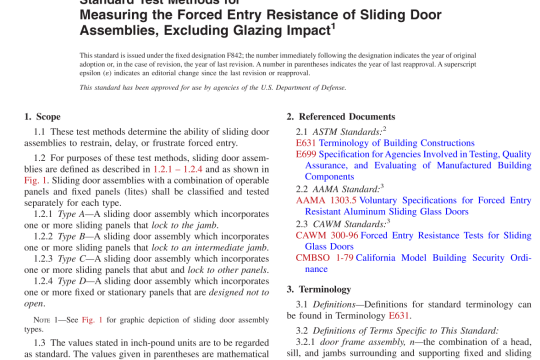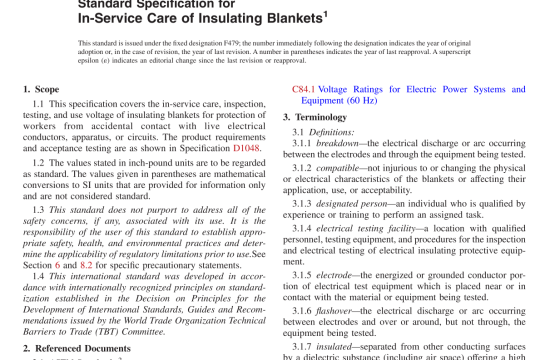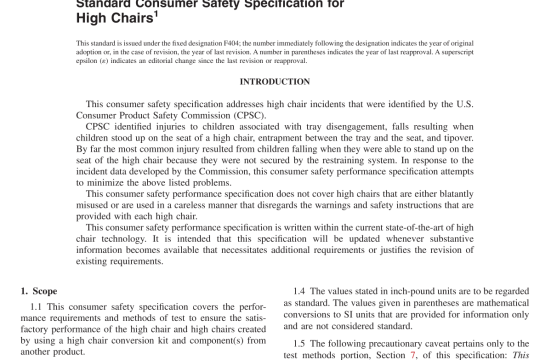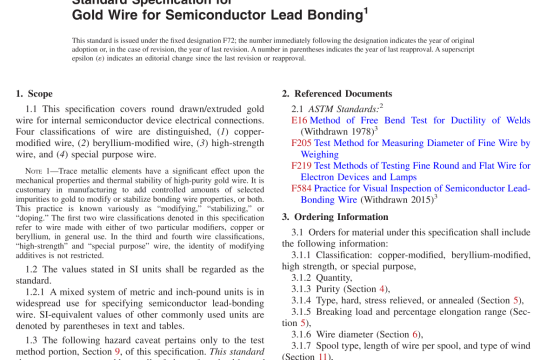ASTM A307-2021 pdf free download
ASTM A307-2021 pdf free download.Standard Specification for Carbon Steel Bolts, Studs, and Threaded Rod 60 000 PSI Tensile Strength
4. Materials and Manufacture
4.1 Steel for bolts, studs, and threaded rod shall be made by the open-hearth, basic-oxygen, or electric-furnace process. 4.2 Bolts shall be produced by hot or cold forging of the heads or machining from bar stock. 4.3 Heat Treatment: 4.3.1 Cold headed fasteners with head configurations other than hex having a specified minimum head height less than or equal to 0.5 D (D is nominal diameter) shall be stress relief annealed at a minimum temperature of 875 °F. This would include cold headed Round Head and Round Head Square Neck Bolts in accordance with ASME B 18.5. When specified by the purchaser, cold headed hex head bolts and screws shall be stress relieved at 875 °F minimum. 4.3.2 Stress relieving of hex head fasteners and those with minimum head heights greater than 0.5 D shall be at the manufacturer’ s option.4.5 Zinc Coatings, Hot-Dip and Mechanically Deposited: 4.5.1 When zinc-coated fasteners are required, the pur- chaser shall specify the zinc-coating process, for example hot dip, mechanically deposited, or no preference. 4.5.2 When hot-dip is specified, the fasteners shall be zinc-coated by the hot-dip process in accordance with the requirements of Specification F2329/F2329M. 4.5.3 When mechanically deposited is specified, the fasten- ers shall be zinc-coated by the mechanical-deposition process in accordance with the requirements of Class 55 of Specifica- tion B695. 4.5.4 When no preference is specified, the supplier may furnish either a hot-dip zinc coating in accordance with Specification F2329/F2329M, or a mechanically deposited zinc coating in accordance with Specification B695, Class 55. Threaded components (bolts and nuts) shall be coated by the same zinc coating process and the supplier ‘s option is limited to one process per item with no mixed processes in a lot.
5. Chemical Composition
5.1 Grade A and B bolts, studs, and threaded rod shall have a heat analysis conforming to the requirements specified in Table 1 based on the steel producer’s heat analysis. 5.2 The purchaser shall have the option of conducting product analyses on finished bolts in each lot, which shall conform to the product analysis specified in Table 1. 5.3 In case of conflict or for referee purposes, the product analysis shall take precedence. 5.4 Bolts and studs are customarily furnished from stock, in which case individual heats of steel cannot be identified. 5.5 Application of heats of steel to which bismuth, selenium, tellurium, or lead has been intentionally added shall not be permitted for Grade B bolts and studs. 5.6 Chemical analyses shall be performed in accordance with Test Methods, Practices, and Terminology A751.
6. Mechanical Properties
6.1 Grades A and B bolts, studs, and threaded rod shall conform to the hardness specified in Table 2. 6.2 Grade A and B bolts, studs, and threaded rod 1/2 in. in diameter or less, other than those excepted in 6.4, shall be tested full size and shall conform to the requirements for tensile strength specified in Table 3. Threaded rod is permitted to be cut to a length suitable for tensile testing and shall be treated using the same method specified for studs. 6.3 Grade A and B bolts, studs, and threaded rod larger than 1/2 in. in diameter, other than those excepted in 6.4, shall preferably be tested full size and when equipment of sufficient capacity is available and shall conform to the requirements for tensile strength specified in Table 3. When equipment of sufficient capacity for full-size testing is not available, or when the length of the bolt or stud makes full-size testing impractical, machined specimens shall be tested and shall conform to the requirements specified in Table 4. 6.4 Grades A and B bolts and studs less than three diameters in nominal length or bolts with drilled or undersize heads are not subject to tensile tests. 6.5 In the event that bolts, studs, and threaded rod are tested by both full size and by machine test specimen methods, the full-size test shall govern if a controversy between the two methods exists. 6.6 For bolts, studs, and threaded rod on which both hardness and tension tests are performed, acceptance based on tensile requirements shall take precedence in the event that there is controversy over low readings of hardness tests.




